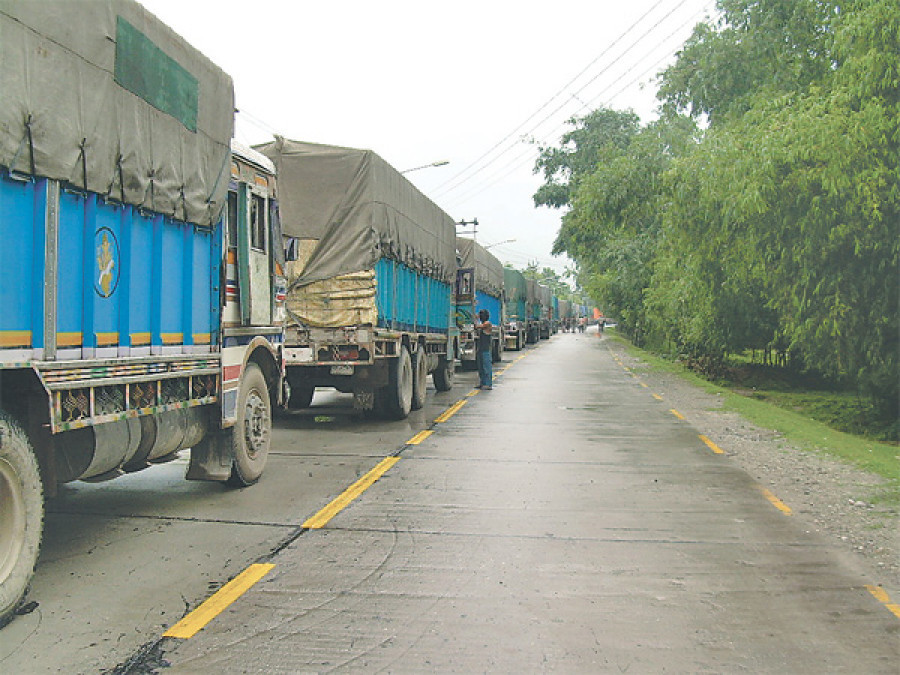Money
Nepal, Bangladesh to sign preferential trade arrangement by 2020-end
Bangladesh will soon provide on-arrival visa through the land route for Nepalis.
Krishana Prasain
Nepal and Bangladesh have decided to sign a bilateral preferential trade arrangement by the end of 2020.
The sixth Nepal-Bangladesh Commerce Secretary level virtual meeting on trade and economic cooperation that concluded on Thursday decided to hold the technical committee meeting in the third week of November to finalise the list of products, text of preferential trade arrangement and rules of origin.
The meeting was led by Baikuntha Aryal, secretary at the Ministry of Industry, Commerce and Supplies.
Prakash Dahal, joint secretary at the ministry, said that the product list under the preferential trade agreement was not finalised as the discussion was primarily focused on tariff, para-tariff and non-tariff barriers in the listed products.
Earlier, at the commerce secretary-level meeting held in March in Dhaka, the two sides had agreed to sign a preferential trade arrangement by June but it was postponed due to the spread of the coronavirus pandemic.
“The Nepali delegation has been asking for the removal of other duty charges as it raises the product cost of Nepali goods. The Bangladesh delegation was not in favour of removing the charges as they said it could impact the country’s revenue,” said Dahal.
Nepal is seeking zero tariffs on goods listed under the agreement and the removal of other duties and charges.
A list of products under the preferential trade agreement has been exchanged and will be discussed one by one by both delegations, said Dahal. The preferential trade agreement is also one of the issues that prime ministers of both countries wanted to finalise as soon as possible, according to government officials.
The Nepali side also discussed the issue of yarn export. Last year, Bangladesh decided to lift the ban on yarn imports from Nepal via the Banglabandha land port after nearly 17 years.
The move conditionally allows Nepal to export only acrylic yarn through the port with the ban initially being withdrawn for only one year.
Nepal has long been demanding Bangladesh to open the gateway for exporters of Nepali yarn. In 2002, Bangladesh imposed the restriction on yarn import through the land port seeking to safeguard the local cotton yarn industry from foreign products.
The country instead opened up its Benapole land port and Chittagong sea port for yarn import. However, Nepali traders have been reluctant to use the Benapole port, which connects Petrapole of India, stating that they face a lot of hassles while using the gateway that passes through the Indian land customs.
“As Bangladesh has been charging high tariffs on many goods exported from Nepal, we have asked them to review it and bring it down to zero,” said Dahal. The Nepali delegation also asked the Bangladeshi government to build infrastructure like customs and quarantine offices as the lack of such facilities has been causing a delay for Nepali goods exported to Bangladesh.
Similarly, Bangladesh has proposed implementing the Bangladesh, Bhutan, India, Nepal (BBIN) initiative for cargo transit between Nepal and Bangladesh.
“As Bhutan has not consented to the agreement, we have informed our Bangladeshi counterpart that the BBIN initiative will take time to be implemented,” Dahal said.
Bangladesh is interested in starting Saidpur-Bhadrapur or Biratnagar flights to promote tourism for mutual benefit. “As the flights will be beneficial to both countries, the Bangladeshi delegation has requested to start flights soon,” he said. “We will discuss this issue with the concerned authorities and inform the Bangladesh delegation over its development.”
Another topic discussed was the Rohanpur-Singhabad railway transit, designated to enhance Nepal-Bangladesh trade but it has not come into operation. Nepal is set to import chemical fertilisers which it had asked from the Bangladeshi government last month. Dahal said that Bangladesh was ready to bring the railway transit operation online.
The Bangladeshi delegation also proposed to sign a double taxation avoidance agreement. The proposal has been tabled at the Cabinet, Dahal said, adding that preparation was underway to sign a memorandum of understanding to share agriculture know-how between the Department of Agriculture Extension of Bangladesh and Nepal’s Department of Agriculture.
The discussion also included visa process simplification and Bangladesh raised the issue to simplify the process for investors and businessmen.
As Nepal had raised concerns regarding visas for students, the Bangladeshi delegation said the country has been providing a one-time visa for students till the completion of study from 2019.
Bangladesh has decided to provide on-arrival visa through the land route for Nepalis and it will be implemented soon, said Dahal.
However, the Bangladesh delegation raised issues regarding procedural hassles while opening a pharmaceutical company in Nepal.
Bilateral trade between Nepal and Bangladesh started to take a leap after the Kakarbhitta-Phulbari-Banglabandha transit route came into operation on August 31, 1997.
Nepal has been facing a trade deficit with Bangladesh since 2014-15.
In 2019-20, Nepal imported goods worth Rs5.29 billion while it made export earnings of Rs954 million from Bangladesh, according to the statistics of the Department of Customs.




 8.22°C Kathmandu
8.22°C Kathmandu














